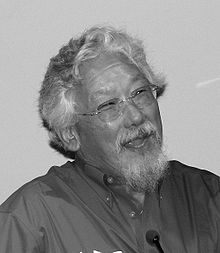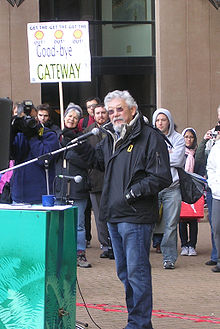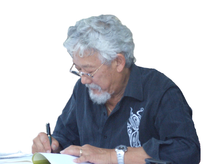- David Suzuki
-
David Suzuki 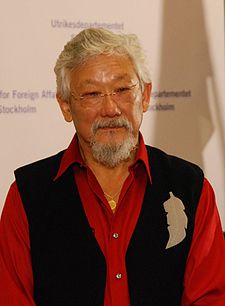
Suzuki in 2009Born David Takayoshi Suzuki
March 24, 1936
Vancouver, British Columbia, CanadaResidence Kitsilano, Vancouver, Canada Citizenship Canada Nationality Canadian Signature

David Takayoshi Suzuki, CC, OBC (born March 24, 1936) is a Canadian academic, science broadcaster and environmental activist. Suzuki earned a Ph.D in zoology from the University of Chicago in 1961, and was a professor in the genetics department of the University of British Columbia from 1963 until his retirement in 2001. Since the mid-1970s, Suzuki has been known for his TV and radio series and books about nature and the environment. He is best known as host of the popular and long-running CBC Television science magazine, The Nature of Things, seen in over forty nations. He is also well known for criticizing governments for their lack of action to protect the environment.
A long time activist to reverse global climate change, Suzuki co-founded the David Suzuki Foundation in 1990, to work "to find ways for society to live in balance with the natural world that sustains us." The Foundation's priorities are: oceans and sustainable fishing, climate change and clean energy, sustainability, and Suzuki's Nature Challenge. He also served as a director of the Canadian Civil Liberties Association from 1982-1987.
Suzuki was awarded the Right Livelihood Award in 2009.
Contents
Early life
Suzuki has a twin sister named Marcia, as well as two other siblings, Geraldine (now known as Aiko) and Dawn. They were born to Setsu Nakamura and Kaoru Carr Suzuki in Vancouver, Canada. Suzuki's maternal and paternal grandparents had immigrated to Canada at the beginning of the 20th century from Hiroshima and Aichi Prefecture respectively.[1]
A third-generation Japanese-Canadian ("Canadian Sansei"), Suzuki and his family suffered internment in British Columbia during the Second World War from when he was there (1942) until after the war ended. In June 1942, the government sold the Suzuki family's dry-cleaning business, then interned Suzuki, his mother, and two sisters in a camp at Slocan in the British Columbia Interior.[2] His father had been sent to a labour camp in Solsqua two months earlier. Suzuki's sister, Dawn, was born in the internment camp.
After the war, Suzuki's family, like other Japanese Canadian families, was forced to move east of the Rockies. The Suzukis moved to Islington, Leamington, and London, Ontario. Suzuki, in interviews, has many times credited his father for having interested him in and sensitized him to nature.
Suzuki attended Mill Street Elementary School and Grade 9 at Leamington Secondary School before moving to London, where he attended London Central Secondary School, eventually winning the election to become Students' Council President in his last year there by more votes than all of the other candidates combined.
Academic career
Suzuki received his BA from Amherst College of Massachusetts in 1958, and his Ph.D in zoology from the University of Chicago in 1961.
Early in his research career he studied genetics, using the popular model organism Drosophila melanogaster (fruit flies). To be able to use his initials in naming any new genes he found, he studied dominant temperature-sensitive phenotypes (DTS). (As he jokingly noted at a lecture at Johns Hopkins University, the only alternative was "damn tough skin".) He was a professor in the genetics department (stated in his book Genethics: The Ethics of Engineering Life, 1988) at the University of British Columbia for almost forty years (from 1963 until his retirement in 2001), and has since been professor emeritus at a university research institute.[3]
Broadcasting career
Suzuki began in television in 1970 with the weekly children's show Suzuki on Science. In 1974, he founded the radio programme Quirks and Quarks which he also hosted on CBC Radio One from 1975 to 1979. Throughout the 1970s, he also hosted Science Magazine, a weekly programme geared towards an adult audience.
Since 1979, Suzuki has hosted The Nature of Things, a CBC television series that has aired in nearly fifty countries worldwide.[4] In this program, Suzuki's aim is to stimulate interest in the natural world, to point out threats to human well-being and wildlife habitat, and to present alternatives for achieving a more sustainable society. Suzuki has been a prominent proponent of renewable energy sources and the soft energy path.
Suzuki was the host of the critically acclaimed 1993 PBS series The Secret of Life.[5] His 1985 hit series, A Planet for the Taking, averaged more than 1.8 million viewers per episode and earned him a United Nations Environment Programme Medal. His perspective in this series is summed up in his statement: "We have both a sense of the importance of the wilderness and space in our culture and an attitude that it is limitless and therefore we needn't worry." He concludes with a call for a major "perceptual shift" in our relationship with nature and the wild.
Suzuki's The Sacred Balance, a book first published in 1997 and later made into a five hour mini-series on Canadian public television, was broadcasted in 2002.[6][7] Suzuki is now taking part in an advertisement campaign with the tagline "You have the power", promoting energy conservation through various household alternatives, such as the use of compact fluorescent lightbulbs.
For the Discovery Channel Suzuki also produced "Yellowstone to Yukon: The Wildlands Project" in 1997. The conservation-biology based documentary focused on Dave Foreman's Wildlands Project, which considers how to create corridors between and buffer-zones around large wilderness reserves as a means to preserve biological diversity. Foreman developed this project after leaving Earth First! (which he co-founded) in 1990. The conservation biologists Michael Soulé and Reed Noss were also directly involved.
Climate change activism
At the 2007 Global Day of Action event in Vancouver, B.C.. The sign in the background refers to the Greater Vancouver Gateway Program.
In recent years, Suzuki has been a forceful spokesperson on global climate change, not always without controversy. In February 2008, he urged McGill University students to speak out against politicians who fail to act on climate change, stating "What I would challenge you to do is to put a lot of effort into trying to see whether there's a legal way of throwing our so-called leaders into jail because what they're doing is a criminal act."[8][9]
Suzuki is unequivocal that climate change is a very real and pressing problem and that an "overwhelming majority of scientists" now agree that human activity is responsible. The David Suzuki Foundation website has a clear statement of this:
The debate is over about whether or not climate change is real. Irrefutable evidence from around the world - including extreme weather events, record temperatures, retreating glaciers, and rising sea levels - all point to the fact climate change is happening now and at rates much faster than previously thought.
The overwhelming majority of scientists who study climate change agree that human activity is responsible for changing the climate. The United Nations Intergovernmental Panel on Climate Change (IPCC) is one of the largest bodies of international scientists ever assembled to study a scientific issue, involving more than 2,500 scientists from more than 130 countries. The IPCC has concluded that most of the warming observed during the past 50 years is attributable to human activities. Its findings have been publicly endorsed by the National Academies of Science of all G-8 nations, as well as those of China, India and Brazil.[10]
Suzuki says that despite this growing consensus, many in the public and the media seemed doubtful about the science for many years. The reason for the confusion about climate change, in Suzuki's view, was due to a well-organized campaign of disinformation about the science involved. "A very small number of critics" denies that climate change exists and that humans are the cause. These climate change “skeptics” or "deniers," Suzuki claims, tend not to be climate scientists and do not publish in peer-reviewed scientific journals but rather target the media, the general public, and policy makers. Their goal: "delaying action on climate change." According to Suzuki, the skeptics have received significant funding from coal and oil companies, including ExxonMobil. They are linked to "industry-funded lobby groups," such as the Information Council on the Environment (ICE),[11] whose aim is to "reposition global warming as theory (not fact)."[10]
In 2009, Suzuki called for putting Prime Minister of Canada Stephen Harper in jail.
Carbon footprint
Suzuki himself laments that in traveling constantly to spread his message of climate responsibility, he has ended up "over his [carbon] limit by hundreds of tonnes." He has stopped vacationing overseas and taken to "clustering" his speaking engagements together to reduce his carbon footprint. He would prefer, he says, to appear solely by video conference.[12]
Publications
Suzuki is the author of 52 books (fifteen for children), including David Suzuki: The Autobiography, Tree: A Life Story, The Sacred Balance, Genethics, Wisdom of the Elders, Inventing the Future, and the best-selling Looking At series of children’s science books. This is a partial list of publications[13] by Suzuki:
- Sciencescape - The Nature of Canada (1986) - with Hans Blohm and Marjorie Harris
- Pebbles to Computers: The Thread (1986) - with Hans Blohm and Stafford Beer
- Metamorphosis: Stages in a life (1987)
- Genethics: The Clash between the New Genetics and Human Values (1990)
- It's a Matter of Survival (1991) ISBN 0674469704
- [Time to Change] (1994)
- The Japan We Never Knew:A Journey of Discovery (1997) with Keibo Oiwa
- More Good News (2003)[14]
- David Suzuki: The Autobiography (2006)
- The Sacred Balance (2007)
- David Suzuki's Green Guide (2008) with David Boyd
- The Big Picture: Reflections on Science, Humanity, and a Quickly Changing Planet (2009) with David Taylor
- The Legacy: An Elder's vision for a sustainable future (2010) foreword by Margaret Atwood
- Force of Nature: The David Suzuki Movie (2010) 93 minute documentary DVD (210616DV)[15][16][17]
Awards and honours
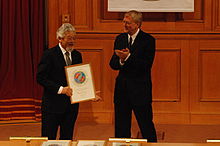 Suzuki receives the Right Livelihood Award from Jakob von Uexkull
Suzuki receives the Right Livelihood Award from Jakob von Uexkull
Suzuki is the recipient of the Order of Canada, first as an Officer (1976), then upgraded to Companion status in (2006),[18] the Order of British Columbia (1995),[19] UNESCO’s Kalinga Prize for science (1986)[20] and a long list of Canadian and international honours.
In 2004, Suzuki was nominated as one of the top ten "Greatest Canadians" by viewers of the CBC. In the final vote he ranked fifth.[21] Suzuki said that his own vote was for Tommy Douglas who was the eventual winner.
In 2006, Suzuki was the recipient of the Bradford Washburn Award presented at the Museum of Science in Boston, Massachusetts.[22]
In 2009 Suzuki was awarded the Honorary Right Livelihood Award.[23]
Honorary degrees
Suzuki has received numerous honorary degrees from universities around the world.[24]
- University of Prince Edward Island in Charlottetown (LL.D) in 1974
- University of Windsor in Windsor, Ontario (D.Sc) in 1979
- Acadia University in Wolfville, Nova Scotia (D.Sc) in 1979
- Trent University in Peterborough, Ontario (LL.D) in 1981[25]
- University of Calgary in Calgary, Alberta (LL.D) in 1986
- Governors State University in University Park, Illinois (DHL) in 1986
- Lakehead University in Thunder Bay, Ontario (D.Sc) in 1986
- McMaster University in Hamilton, Ontario (D.Sc) in 1987
- Queen's University in Kingston, Ontario (LL.D) in 1987
- Carleton University in Ottawa, Ontario (D.Sc) in 1987
- Amherst College in Amherst, Massachusetts, (D.Sc) in 1988
- Griffith University in Queensland, Australia (D.Sc) in 1997
- Open University, Milton Keynes, UK DDL in 1998
- Whitman College in Walla Walla, Washington, (D.Sc) in 1999
- Unity College in Unity, Maine, (Doctor of Environmental Science) in 2000
- Simon Fraser University in Burnaby, British Columbia DDL in 2001
- York University in Toronto, Ontario (D.Sc) in 2005
- UQAM in Montreal, Quebec (D.Sc) in 2005
- Flinders University in Adelaide, South Australia (D.Sc) in 2006
- Ryerson University in Toronto, Ontario (Doctor of Communication) in 2007
- University of Montreal in Montreal, Quebec (D.Sc) in 2007
- University of Western Ontario in London, Ontario (D.Sc) in 2007
- Lambton College in Sarnia, Ontario (Diploma in Alternative Energy Engineering Technology) in 2008[26]
- Memorial University of Newfoundland in St. John's, Newfoundland (D.Sc) in 2009
- Université Sainte-Anne in Church Point, Nova Scotia, Nova Scotia (Honorary Doctorate) in 2010 [27]
- Laval University in Québec, Canada (Doctor of Communication) in 2011
See also
References
Footnotes
- ^ Environmentalist David Suzuki has words of warning for ancestral homeland Kris Kosaka, April 25, 2009, The Japan Times.
- ^ Gordon, K. (2007) The Slocan Valley - Our History, Slocan Valley Economic Development Commission. Retrieved on July 28, 2007.
- ^ "David Suzuki's profile". Greenfestivals.org. http://www.greenfestivals.org/content/view/258/111. Retrieved 2011-02-21.
- ^ "CBC website on Nature of Things". Cbc.ca. 2007-05-18. http://www.cbc.ca/natureofthings/timeline.html. Retrieved 2011-02-21.
- ^ Review of The Secret of Life 25 September 1993 New York Times. Retrieved 21 July 2008.
- ^ "Broadcast schedule of The Sacred Balance". Sacredbalance.com. http://www.sacredbalance.com/web/portal/index.php?singleid=151. Retrieved 2011-02-21.
- ^ "Production Team of The Sacred Balance". Sacredbalance.com. 2002-10-13. http://www.sacredbalance.com/web/peopleresults.html?command=search&db=data/people.db&lastnamesort=1&firstnamesort=2&woroledatarq=production&mytitle=Production. Retrieved 2011-02-21.
- ^ Babbage, Sarah (2008-02-04). "Jail politicians who ignore science: Suzuki". Canada: The McGill Daily. Archived from the original on 2008-02-08. http://web.archive.org/web/20080208132916/http://www.mcgilldaily.com/view.php?aid=6970. Retrieved 2008-02-10.
- ^ Offman, Craig (2008-02-07). "Jail politicians who ignore climate science: Suzuki". Canada: National Post. http://www.nationalpost.com/news/story.html?id=290513. Retrieved 2008-02-07.
- ^ a b "Climate change deniers". Climate Change Science and Policy. The David Suzuki Foundation. http://www.davidsuzuki.org/issues/climate-change/science/climate-change-basics/climate-change-deniers/. Retrieved 2011-08-13.
- ^ The Heat is Online. "The Coal Industry's "ICE" Campaign (1999)." Retrieved on: 2011-08-13.
- ^ Cernetig, Miro. "Suzuki gets the irony as popularity increases". Vancouver Sun (CanWest Global). http://www.canada.com/topics/news/national/story.html?id=b69c68be-dbd3-4b83-81da-a2c2dc09ce5f. Retrieved 2008-01-09.
- ^ Books and Sound Recordings by David T. Suzuki David Suzuki Foundation. Complete Book List. Retrieved on: September 20, 2010.
- ^ "More Good News - D&M Publishers". Dmpibooks.com. http://www.dmpibooks.com/book/more-good-news. Retrieved 2010-07-28.
- ^ "Force of Nature, The David Suzuki Movie : The Nature of Things with David Suzuki : CBC-TV". Cbc.ca. 2011-03-29. http://www.cbc.ca/documentaries/natureofthings/2010/forcesofnature/. Retrieved 2011-10-31.
- ^ "| Arapahoe Library District". Arapahoelibraries.org. 2011-08-25. http://arapahoelibraries.org/ald/details?item=b1588720&title=Force+of+nature%3A+the+david+suzuki+movie. Retrieved 2011-10-31.
- ^ http://www.imdb.com/title/tt1722514/
- ^ "Received Order of Canada". Davidsuzuki.org. 2011-02-03. http://www.davidsuzuki.org/media/news/2011/02/david-suzuki-receives-18th-george-woodcock-lifetime-achievement-award/. Retrieved 2011-10-31.
- ^ "Received Order of British Columbia". Vpl.ca. http://www.vpl.ca/news/details/david_suzuki_receives_18th_george_woodcock_lifetime_achievement_award. Retrieved 2011-10-31.
- ^ "Received UNESCO prize". Cbc.ca. 2007-05-18. http://www.cbc.ca/natureofthings/host.html. Retrieved 2011-02-21.
- ^ "Microsoft Word - Great_minds_in_science_7.doc" (PDF). http://www.vaniercollege.qc.ca/msc/pdf/great-minds/david-suzuki.pdf. Retrieved 2011-10-31.
- ^ "The Unlikely Activist". The Unlikely Activist. http://www.theunlikelyactivist.com/remarkable_people/index.html. Retrieved 2011-02-21.
- ^ "Right Livelihood Award: 2009 - David Suzuki". Rightlivelihood.org Alternative Nobel Prize. http://www.rightlivelihood.org/suzuki.html. Retrieved 2010-07-28.
- ^ Host: Dr. David Suzuki, CBC, 2010
- ^ "Recipients of Honorary & Degrees". Trent University. http://www.trentu.ca/administration/pdfs/TrentUniversityRecipientsofHonoraryDegrees.pdf. Retrieved 2010-07-28.
- ^ "In The News | Lambton College - The Bridge to Your Future". Lambton.on.ca. http://www.lambton.on.ca/display.aspx?id=242. Retrieved 2011-10-31.
- ^ CA (2010-03-20). "Université Sainte-Anne to honour Suzuki - News - The Vanguard". Thevanguard.ca. http://www.thevanguard.ca/News/2010-03-20/article-931628/Universite-Sainte-Anne-to-honour-Suzuki/1. Retrieved 2011-10-31.
Notations
- John C. Phillipson. "David Takayoshi Suzuki" in The Canadian Encyclopedia: Year 2000 Edition, James Marsh, ed. Toronto: McClelland and Stewart, 1999. p. 2277. ISBN 0771020996
- David Suzuki. Metamorphosis. Toronto: Stoddart, 1991. ISBN 0773755098
Further reading
- Suzuki, David (2007), David Suzuki: The Autobiography, Greystone Books, ISBN 9781553652816, http://books.google.ca/books?id=UrUIUZ9Fkg8C&lpg=PP1&dq=David%20Suzuki&pg=PP1#v=onepage&q&f=true
- Suzuki, David; David R. Boyd (2008), David Suzuki's Green Guide, Greystone Books, ISBN 9781553652939, http://books.google.ca/books?id=FgGcvxC0YpkC&lpg=PP1&dq=David%20Suzuki&pg=PP1#v=onepage&q&f=true
- Gazlay, Suzy (2009), David Suzuki: Doing Battle with Climate Change, Crabtree, ISBN 9780778746652, http://books.google.ca/books?id=uEu7DeEBE1sC&lpg=PP1&dq=David%20Suzuki&pg=PP1#v=onepage&q&f=true
External links
- Order of Canada citation
- The David Suzuki Foundation
- Nature of Things official website
- video: "David Suzuki - "Force of Nature", Dec. 14, 2010, with Allan Gregg, 28 minutes,
- Right Livelihood Award
- David Suzuki at the Internet Movie Database
Categories:- Amherst College alumni
- Canadian environmentalists
- Canadian geneticists
- Canadian television hosts
- Companions of the Order of Canada
- Kalinga Prize recipients
- Canadian people of Japanese descent
- Members of the Order of British Columbia
- Non-fiction environmental writers
- People from Vancouver
- Twin people from Canada
- University of British Columbia faculty
- University of Chicago alumni
- Right Livelihood Award laureates
- 1936 births
- Living people
- Canadian atheists
Wikimedia Foundation. 2010.

